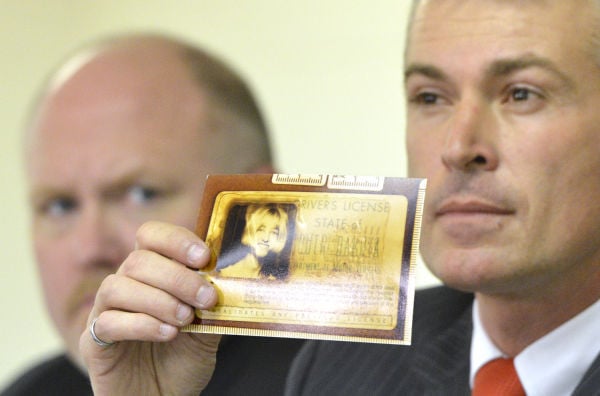When you police a resort town a lot of things can happen; especially during the summer months. Mostly these things are what you would expect of the Jersey Shore: bar fights, noise complaints, drunk drivers, block parties, thefts, burglaries, the occasional domestic violence case, boating accidents, and sometimes a drowning. People who vanish are rare. Of course, lots of children wander away from the parents, but most are found within minutes by life guards or police. So when an adult goes for a walk on a crowded, guarded beach, and simply disappears, it's what we in the police business call
unusual.
Shortly after I was promoted to the rank of chief, I arrived at the department one very hot July morning and, as was my habit, spoke to my second-in-command on my way to my office. Being a good captain, he always arrived before me, scanned the incident reports from the previous evening, and briefed me on anything of note. This morning seemed a part of that routine until he cleared his throat a little nervously, and said, "An older fellow was reported missing late yesterday afternoon. Night shift said he still hasn't turned up."
 |
| I'm the grey guy with the grey beard in the grey suit |
My captain, having known me for many years (hell, we had gone through the academy together), no doubt suspected what my reaction might be. "Since yesterday?" I repeated, my blood pressure rising perceptibly. "And nobody thought to call me, cap?" "No sir. Um...they didn't call me, either. I just found out myself when I came in." Every promotion brings it challenges, this was one it seemed.
The captain hastened to fill in the details: Sometime around four o'clock the previous day an elderly man had taken leave of his family to go for his daily walk on the beach. They had seen him walking north from the 72nd street entrance. When he had not returned within an hour they went looking for him. By six o'clock they were in full panic mode, his wife and adult sons reporting the incident to the police. This was during shift change, and the night shift (patrol worked 12 hour shifts from six to six) received the report. The shift sergeant, newly promoted by yours truly, promptly contacted the beach patrol for their help in locating the victim. All of the guards were polled and not a one remembered the gentleman in question, nor had there been any rescues involving someone matching that description. Inquiries at the hospital proved similarly fruitless. His car was still parked in the driveway, the keys hanging in the house. He had no cell phone (these were still somewhat unusual at the time). Worse still, the wife reported that her husband of more than half a century was in the beginnings of both Parkinson's disease and dementia.
 |
| Beach Path Through High Dunes |
As I mentioned in the beginning, it was a particularly hot July and, unusually for the shore, brutally humid, so dehydration had to be considered a factor here. In other words, these were a bad set of circumstances. A single witness had been found who thought, but wasn't certain, that she had witnessed an elderly gentleman who matched the description of the missing man, staring up at the dunes around forty-fourth street. She thought he appeared confused. Enlisting the aid of the volunteer fire department, the newly-promoted sergeant began a search of the dunes in the vicinity, but darkness overtook them. And in spite of a brilliant bank of search lights provided by one of their ladder trucks, the firemen and police officers found the steep, heavily forested, dunes nearly impenetrable; the angled illumination only deepening the inky shadows. The search had been halted around mid-night without a trace of its object, and I had been left in a similar darkness.
I set about to remedy this situation. Declaring this an emergency operation, I requested the presence of the fire chief, rescue squad chief, beach patrol captain, the emergency management director, and the director of public works. I also notified the mayor formally, though he was a member of the fire department so I knew that he would be on hand in any case. Utilizing a bay of the fire department as a command post, we began to gather our forces as my senior detective, acting as my operations officer, set up tables and maps, and began to orient and coordinate the upcoming effort. My captain was to function as my administrative officer responsible for the smooth functioning of the police department's routine operations, as well as supplying any additional police personnel I might request. The sergeant on duty was placed in charge of logistics (vehicles, equipment, communications, etc…). The rescue chief saw to it an adequate amount of water was distributed throughout the day, while keeping a rig dedicated to treating any searchers who were injured or overcome by the heat. The borough finance officer was even on hand to approve expenditures for food and drink for the small army that was being assembled.
Within the span of a few hours, searchers provided by the fire department, public works, and beach patrol, as well as many other volunteers, were literally combing the town, block by block, house by house. Considering the missing man's possible mental status, it was conceivable he could be anywhere, so I instructed the searchers to ignore nothing, including crawl spaces and to look beneath any object that he could fit under, such as a child's overturned wading pool, shrubbery, or in the back seat of an unlocked car. It had been my experience with such cases that sometime persons being looked for hid in terror of their searchers.
As each block was combed, the various teams called in their lack of success, and the detective drew an X through another grid on the map. Meanwhile, a state police helicopter performed aerial reconnaissance, K-9 units were sent out, and marine officers quietly patrolled the back bays in search of the worst possible result.
The day dragged on growing ever hotter and more humid. Volunteers and officers alike were becoming fatigued and dehydrated. Those in the dunes (which are some of the largest on the Eastern Seaboard) were exhausted from breaking brush in the relentless heat. By five o'clock, the mayor was growing worried about the hundreds of volunteers who had been at it all day. So was I. Both he and the fire chief suggested we call the search off and consider resuming tomorrow. I was both reluctant to give up the remaining daylight, and flummoxed as to where this man could be. By this time, we had covered nearly every possible area he could have reasonably reached. I was looking at miles of x'd-out grids. It was as if he had stepped through the looking glass...and this bothered me. I didn't believe in a looking-glass. He was still out there somewhere. But where the hell could he be? And I was deeply concerned about his physical condition under the circumstances. Based on what I had knew of his advanced age and shaky health from his wife and family, I wasn't at all sure he could make it through another night. My mind raced… then screeched to a halt.
Going over to the map table, I asked the detective sergeant to show me exactly where the search of the previous evening had ended. He pointed to the spot in the dunes where we had begun the daylight effort. "They covered everything north of this point," he assured me. I was looking at a fairly small area of extremely steep and rugged maritime forest; all that the night shift had been able to search before losing the natural light and giving up on the artificial. Turning to the mayor and fire chief, I said, "We can start bringing the searchers back in, but I want a team to go back to the area of the dunes night shift covered and search them again while we still have the light." The fire chief reluctantly nodded, then got on the radio to dispatch them.
As the dozens and dozens of exhausted, dirty, and thirsty men and women began to filter back into the fire dept. bays, their despondency was palpable. We all hated the thought of leaving another human being, especially one who couldn't fend for himself, to endure another night alone and afraid, possibly injured. After having spoken with the missing man's wife and children earlier that day, I had gotten a sense of their anguish. I dreaded having to tell them we had failed again and was considering what I should say, when suddenly my portable crackled into life with an excited voice crying, "We've found him! I think we've found him!" Leaping to my feet, I keyed my mike and asked, "Is he alive?" The answer was immediate, "Yeah, I think he's okay."
The headquarters erupted into cheers, and I knew in that moment that this would always be one of the highlights of my police career– I had had one of those brief, shining moments that don't happen often enough. In truth, I had only thought of the obvious when I sent the team back to the starting point, but at that moment, I felt like Sherlock Holmes. As it turned out, he had been hiding under a bayberry shrub very near the start of the original search. Fearful of the Chinese Communist troops he believed were pursuing him, he had remained hidden for over twenty-four hours. His rescuer had spotted the toe of one his shoes jutting out from beneath the heavy brush. They had passed right by him the night before.
 |
| Chinese Communist Troop–Korea circa 1950 |
When I drove to his home to break the good news to his family, the whole neighborhood was out on their decks and lawns waiting for the news. Being in uniform, and unable to keep from smiling, they easily guessed the outcome, and the entire block began to cheer. It was a good day to be chief.
Postscript: The following day I penned a general order that any time an agency outside of the police department was requested to assist in an urgent matter, myself and the captain were to be notified immediately as to the circumstances. No exceptions.




